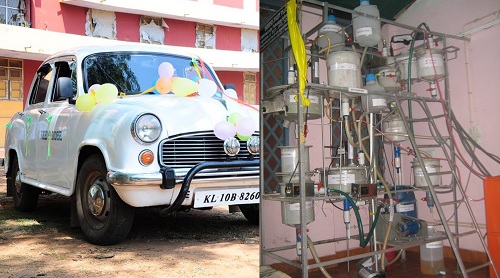By N. Bhadran Nair
Thiruvananthapuram (Kerala) (ISJ Exclusive): A team of researchers from a government college in Kerala get a process to produce biodiesel from a variety of oils patented.
The pilot plant, with a capacity of 15 litre per run, developed by a team from Sree Neelakanta Government Sanskrit College in Pattampi in Palakkad district can use a variety of eco-friendly and low-cost catalysts to produce biodiesel. The patent was granted for biodiesel from a catalyst prepared through chemical modification of rice husk.
“We have tried the prepared biodiesel in diesel generating engine as well as on diesel cars. The performance (mileage) was better with a reduced emission,” Professor N.N. Binitha, professor at the University of Calicut (now Kozhikode) told Indian Science Journal.
The raw material used by the team was used cooking oil, with a catalyst chemically modified from rice husk.
Rice husk ash is treated with sodium hydroxide in a sol gel process and further high temperature treatment to prepare the catalyst. The active catalyst material is Na2SiO3 supported on crysobalite SiO2 (sodium silicate over crystobalite silica).
“We were able to produce almost the same quantity of diesel from the cooking oil used in the process,” Prof. Binitha explained. “The catalyst used once can be used for multiple times, without any loss of its property.”
The team of researchers included Dr. M.R. Reshmi, Head of the Chemistry Department, Dr. V.V Vinu, Dr. K.C. Sudha, S. Sreenikesh from Sree Neelakanta Government Sanskrit College.
Initially they tested with Jatropha, but due to its unavailability they had to abandon it and shift to used cooking oil, which is the cheapest source of raw material.
The research was done under Technology System Development Programme on Alternate Fuels of the federal Department of Science and Technology. The entire pilot plant was designed and manufactured by the team themselves.
India unveiled a national policy on biodiesel in 2018 under its global commitment to reduce fossil fuel by 33-35 percent by 2030.
Currently, bio-diesel is primarily being produced in India from imported palm stearin oil. But the government has decided to promote domestically available used cooking oil to phase out substitution of imported palm oil as the feedstock. Used cooking oil can be collected from bulk consumers like hotels, restaurants, canteens, etc. for conversion.
In 2018, the Food Safety and Standards Authority of India (FSSAI) has enforced a regulation for use of cooking oil. The new regulations have set the maximum permissible limit of Total Polar Compound (TPC) in edible oil at 25 per cent. Repeated frying and usage of edible oil changes its physiochemical and nutrition properties and leads to the formation of TPC, which makes it unfit for human consumption.
Annually about 23 million tonne cooking oil is consumed in India, according to FSSAI. It is estimated that there is a potential to recover and use about 3 million tonnes of used oil for production of biodiesel. As of now, used cooking oil is either not discarded or disposed in an environmentally hazardous manner and sometimes even finds its way to smaller restaurants, and street-vendors.
Prof. Binitha said, biodiesel produced by them could be used without mixing with any other oil or mixed with ordinary diesel upto 95 percent.
While the feasibility of producing economically viable biodiesel from used cooking oil through chemically modified catalyst from rice husk has been proven, the team hopes some manufacturers would come forward to produce it on a commercial scale.
India operated the first test flight powered by biojet fuel in August 2018, when a Bombardier aircraft of budget airliner Spicejet flew in to New Delhi from Dehradun powered by 25 percent biojet fuel made from Jatropha by Indian Institute of Petroleum (IIP) and 75 percent aviation fuel.
On 26 Jan 2019, an AN-32 aircraft, filled with blended bio-jet fuel, had flown over Raj Path at New Delhi during the Republic Day celebrations. Thereafter, the performance and reliability of the Indian technology were also tested when the Russian military aircraft safely landed and took off from Leh airport on 30 Jan 20 at high altitudes under severe winter conditions.
Indian Military has also approved the home-grown technology developed by IIP for use on military aircraft of the Indian Air Force (IAF).
Indian bio-jet fuel can be produced from used cooking oil, tree-borne oils, short gestation oilseed crops grown off-season by farmers, and waste extracts from edible oil processing units. It will reduce air pollution by virtue of its ultralow sulphur content compared with conventional jet fuel and contribute to India’s Net-Zero greenhouse gas emissions targets.
Image courtesy: Prof N.N. Binitha


